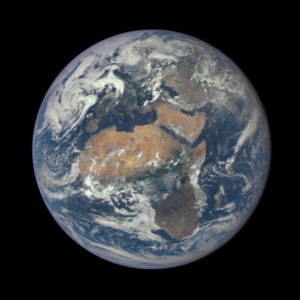
Centre national d’etudes spatiales (CNES) President Jean-Yves Le Gall and Jean-Paul Moatti, Chairman and CEO of the Institut de recherche pour le développement (IRD), the French National Research Institute for Sustainable Development, signed a framework cooperation agreement at the agency’s Toulouse Space Centre on space supporting the development of Southern Nations on 18 October 2019. The agreement will run for five years (2019-2024) and is tacitly renewable. The two partners have been working together under two other agreements since 2009 and now wish to continue seeking synergies between their missions and pooling expertise in their respective domains of excellence.
CNES is pursuing an ambitious partnership strategy to promote uptake of space technologies and meet the challenges facing society, notably in agriculture, environmental management, climate change response, risk mitigation and crisis management, all areas of the utmost importance for developed and Southern Nations alike.
IRD is applying an original approach to research, expertise, training and knowledge sharing for communities and countries that are making science and innovation one of the main levers for reaching Agenda 2030 Sustainable Development Goals (SDGs). It is leading research programmes that make use of satellite data and working to encourage their uptake for the purposes of research devoted to developing Southern Nations.
CNES and IRD are working together within the Form@Ter, AERIS, THEIA and ODATIS data centres, the regional GeoDEV network, the Data Terra research infrastructure and the CORIOLIS inter-organization agreement to implement the SPOT 6/7 national remote-sensing component, to put in place the national structure for shared procurement of satellite imagery (DINAMIS) and in the field of space hydrology through a multi-partner working group agreement and an agreement with CICOS, the international Congo-Oubangui-Sangha basin committee.
IRD and CNES are also involved as overseeing authorities with the CESBIO1, GET2 and LEGOS3 joint research units and the OMP4 and Data Terra joint service units.
The two partners firmly believe in the positive spin-offs and great potential of space applications for the economic and scientific development of Southern Nations. They are looking at cooperating on climate and environment issues with a view to developing tools for integrated management of resources and territories. In particular, CNES and IRD are currently working to finalize their collaboration on the Space Climate Observatory (SCO). They will be pursuing and expanding joint research and innovation activities at international, national and regional level, based on mutual use of each other’s equipment and scientific instruments and on optimizing research by exchanging data to support these activities. The two organizations have also decided to collaborate on building capacity in Southern Nations through training and tele-learning.
After today’s signing, CNES President Jean-Yves Le Gall commented: “I am delighted to see this new phase in the partnership between CNES and IRD, which translates once again our agency’s desire to bring the scientific benefits of its space programmes to research in the fields of climate, environment and health. Whether by facilitating access to satellite imagery and its applications, encouraging a broad-ranging and integrated approach to resources, aiding crisis management or enabling new approaches for high-seas, coastal and littoral oceanography, CNES can contribute its expertise, driven by its underlying commitment to tackling climate change. In this respect, I would also like to hail IRD for supporting and formally committing from the outset to the Space Climate Observatory (SCO) geared towards studying climate change and its impacts.”
IRD Chairman and CEO Jean-Paul Moatti added: “The renewal of our framework agreement reflects our excellent collaboration over many years on research and training programmes in the field, which have had a great impact, working with the scientific community in our partner nations. This renewed partnership will allow us to develop new and innovative tools for monitoring climate and the environment to gain deeper insight into global changes and how they are affecting societies, to serve Sustainable Development Goals. As Jean-Yves has underlined, our collaboration on the Space Climate Observatory (SCO), launched at the One Planet Summit in 2017 and officially inaugurated by President Macron on 17 June at the Paris Air Show, is the perfect symbol of the fresh momentum imparted by this renewal of our institutional partnership.”





